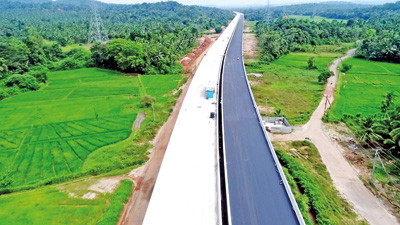News
Govt. cash-strapped: Major projects hobble along
Twenty of Sri Lanka’s biggest construction companies are still owed Rs 26bn by the Government, with some payments pending since October last year.

The Central Expressway
The continued absence of a national budget for 2020 has slowed down implementation of State contracts. Hardest hit are the highways, water supply, health, education and higher education sectors.
Earlier this year, the Government said it would put on hold all major projects, including road and building construction, until the presentation of a budget in August. None of the initiatives are suspended, however. And there is no provision in these contracts for work to be halted over late payments.
But work is slow. “There are some restrictions in allocating the actual funds needed to implement the projects,” said R M A Ratnayake, Deputy Treasury Secretary. “That doesn’t mean they are stopped. They are going on with some difficulty.”
The additional financing requirement to meet unpaid bills will be submitted to Parliament through a new budget, now scheduled for June, he said.
“We have not stopped anything but are managing with the existing, small allocation,” said Priyath Bandu, Secretary to the Ministry of Urban Development, Water Supplies and Housing Facilities. “Everything has slowed down and we have requested not to start new projects.”
Around 12 to 13 projects in the water sector and up to five projects in urban development are affected for two reasons. “Where they are locally funded, there is no budgetary allocation to pay them,” he explained. “But with other projects which are financed by loans, the bills have gone to the External Resources Department but cannot be settled because of the borrowing limit.”
Mr Bandu predicted that there will be a “massive impact” on workers if something is not done within a short period of time.
The eleven companies implementing the second segment of the Central Expressway (from Mirigama to Kurunegala) have payments outstanding from October last year, said Nissanka Wijeratne, Secretary General and Chief Executive Officer of the Chamber of Construction Industries (CCI).
The Road Development Authority (RDA) has recorded an 84 percent physical progress Central Expressway II. It was due to have been completed by July 31 but could take till end 2020 owing to technical reasons. The Project Director said the RDA hoped to settle outstanding payments by next month.
Some foreign-funded initiatives are also affected, those monies are contingent to counterpart financing pledged by the Government being released. “If the payments are not made, salaries may be delayed and there could be layoffs,” Mr Wijeratne warned. “We are hoping, at the very least, that 50 percent of dues are settled before Sinhala and Tamil New Year.”
Companies were running on overdrafts but banks are increasingly reluctant to provide facilities. “We understand the Government has a problem in payments,” he accepted. “If the banks gave credit, maybe the companies can push over the difficulties. But the banks are unable to extend anymore. In fact, the banks now think the construction sector is a plague.”
In February, the Government sought Parliamentary approval to amend the previous administration’s 2020 Vote on Account. It sought to increase the debt ceiling from Rs 721bn to Rs 1,078 billion and to make additional budgetary provisions of Rs 367bn to settle bills of completed projects.
But the Government lacked a majority in Parliament and withdrew the motion after the Opposition, instead of supporting the amendment, wanted it put to a vote. Meanwhile, the money allocated by the Vote on Account reportedly ran out by November 20 last year.
Various companies are impacted differently by the situation, with the small and media level entities taking a severe beating. But companies with a wider portfolio of State and private sector projects are better managing their cash flows.
This includes Access Engineering PLC. “If you have multiple projects, you have different advance payments and also better cash flow management because certain projects are cash negative while others are positive,” said Christopher Joshua, Managing Director. “The burden is greater on companies with single projects as they are dependent on those payments.”
“There have been no instances where there has been no payment at all,” he also said “There has been delayed payment.”
But the longer this lag continues, the harder the cash flows will be hit. And, as Priyantha Perera, Chairman of Sierra Engineering & Construction (Pvt) Ltd, pointed out, it’s not just one challenge the industry faces at present. The Covid-19 virus is starving builders of supplies. “Almost all construction material except for steel and cement come from China,” he said. “Project implementation will be slower.”
Sixty-five percent of construction projects are from the Government,” said a senior construction source said, requesting anonymity. “When 65 percent is not paying, it hits us. If it goes on like this, work will come to a grinding halt. At present, it’s still going on but at a snail’s pace.”
Implementation, however, has never typically been fast in Sri Lanka. And companies usually factor delays and other risks into their project price, said a source from the Finance Ministry’s Department of Project Management and Monitoring.
“Our problem is that development results are not delivered as expected by these projects,” the official said, requesting anonymity. “The contract values for Government projects are also very high and they have assurance that they will get the money. When they make a bid, they take all these into consideration. Nowadays, these contractors take mobilisation advances and invest those in other projects. They are rolling.”
The senior construction source earlier quoted rejected that they include such risks in their contract price. “You cannot factor anything when you are bidding competitively,” he scoffed. “Contractors are not astrologers to predict what will happen.”


